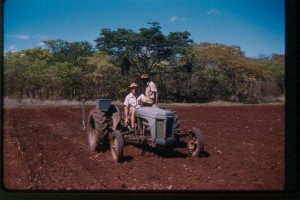Getting Reacquainted

Getting Reacquainted
The next morning at Giraffe Farm Philip appeared. He nearly dropped the early morning teatray— teapot, and hot water jug, cups and saucers, milk jug, sugar bowl and plate of biscuits. When he saw Tim he exclaimed, “Ah! Ah! Ah! Sakubona Nkos, wena pendugili!” (I see you sir, you have returned!) Philip had worked for Gervas since before Tim was born. Long before dawn, he was in the kitchen preparing food and often there late at night, taking a few hours off in the afternoon.
Getting Reaquainted
While Tim was overseas, Gervas and Dorothy Hughes had designed and built Giraffe Farmhouse, on a koppie with a lovely view.When Tim was young at the Greenham Farmhouse and Gervas was away for the night, Philip would insist on sleeping in the kitchen to look after ‘the Missis’ (his Aunt Joanie) and the children. He didn’t smoke but enjoyed snuff. His major weakness was drinking ‘tshwala’ (African beer) brewed on the farms with a permit held by the farmer, to be consumed from 2pm Saturday to 5pm Sunday. Philip still produced Sunday meals but by afternoon he would be curled up on the kitchen floor. Someone would have to take him home.
At sun up it was time for work. Father and son went to the machinery shed where the labour was assembled. The African employees greeted the son of Matambega with a row of smiling faces and a chorus of “Sakubona Nkos”. Tim was pleased to be able to reply in Sindabeli, the local dialect. He had practiced the language with Rhodesian student, Buster Arnold, at the Wiltshire College.
Gervas had made plans: Tim was to manage Melrose Farm under his direction and live at the old Melrose house. Mark cooked and kept house. Elias, the gardener, produced all the vegetables and fruit for both homesteads. A team of agricultural workers and tractor drivers grew maize as the primary crop. Fodder crops were grown for the Giraffe Farm dairy and beef cattle.
Matambega paid the monthly wages to all the Africans as well as to his son; a small cash payment, food, lodging and a vehicle (the old Vanguard van) made up Tim’s salary. The van had seen better days. It let in so much red dust that Tim had to wear a rain coat on his way to town to keep his good clothes clean.
The 1939 Chevrolet pickup was nowhere to be seen, “Dad, where’s my Chev?”
“Oh that! Someone offered me £100, so I sold it.”
Tim had been looking forward to restoring it. He was too upset even to ask where the money had gone.
Gervas planned to continue to manage the ranching on Giraffe, Greenham and Glen Arrock Farms, running a breeding herd of about 1000 Afrikander cattle. Everyone worked six days a week with Sundays off.
At the base of the koppie on Giraffe Farm there were now cow sheds, pump/generator building and a security building for machinery as well as dairy cow feed storage and a cream separating room and cattle yards for Dorothy’s small Jersey dairy herd.
Every morning and evening, she and her dairy men would milk all her lactating cows. Bottles of cream were given to special friends in Que Que and sold to the local butter factory. Skim milk, the by-product, went to her Jersey calves, but in times of plenty, Dorothy also gave the milk to the farm workers’ families.
On Sundays Tim spent the day at Giraffe Farm with Dorothy and his father. He wrote an aerogramme to Eleanor at least once a week and sometimes twice if he could keep awake at night after a long day’s work.

Tim Hughes and Philamon planting at Melrose Farm outside Que Que. Rains arrived just before the window of opportunity closed for putting maize seed into the ground. (1961)
Many thanks to Tim Hughes for this excerpt and photo from his unpublished manuscript Matambega and Son written in the 1980’s.
